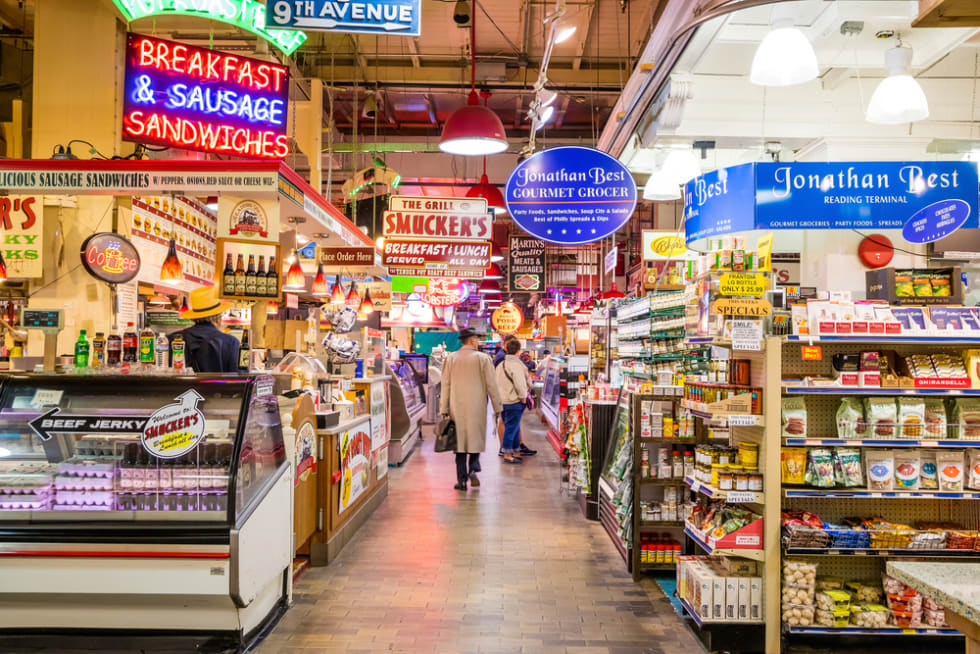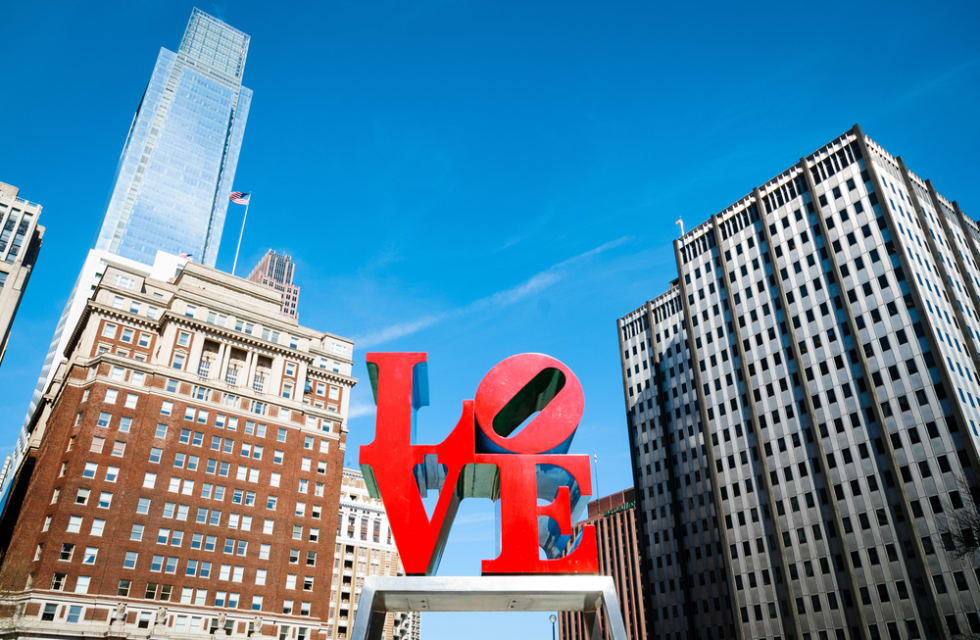- 127 units available
- 1 bed • 2 bed • 3 bed
- Amenities
In unit laundry, Patio / balcony, Granite counters, Hardwood floors, Dishwasher, Pet friendly + more

The cost of living in Philadelphia, PA is 4.3% above the national cost of living, making the city a relatively affordable option for renters looking to enjoy life in a major metropolitan area without paying the sky-high prices of cities like New York, Boston, or San Francisco.
Known as the City of Brotherly Love, Philadelphia's personality is as colorful as its murals. Its residents are resilient, welcoming, and fiercely proud of their hometown. You’ll see it in impromptu performances in Rittenhouse Square, coffee shop debates that could double as theater, and the way locals rally for their sports teams.
Speaking of sports, Philly’s home to passionate fans and iconic teams like the Eagles, Phillies, 76ers, and Flyers. The city’s sports culture is more than just about the games; it's a unifying force that brings people from all walks of life together.
If you're considering a move to Philadelphia, we've got you covered. This guide will break down the cost of living in Philadelphia—from rent and groceries to healthcare and everything in between.
For a city as big as Philadelphia, the City of Brotherly Love still manages to be easier on the wallet than many major metros. The overall cost of living sits 4.3% above the national average, and 10.3% higher than Pennsylvania’s average—but well below what you’d spend in New York City or San Francisco.
Below, we break down the data of different cost of living categories in Philadelphia compared to the rest of the U.S:
| Cost of Living | Philadelphia | U.S. |
|---|---|---|
| Overall | 104.3 | 100 |
| Grocery | 102.5 | 100 |
| Health | 102.1 | 100 |
| Housing | 75.9 | 100 |
| Median Home Cost | $205,900 | $338,100 |
| Utilities | 107.7 | 100 |
| Transportation | 141.9 | 100 |
| Miscellaneous | 109.5 | 100 |
The cost of living is highest in some of Philadelphia’s most desirable and centrally located neighborhoods—Logan Square, Center City West, and Fitler Square.
Rents in these areas may be higher, but living here means being within walking distance of museums, theaters, offices, and so much more.
| Neighborhood | Average One-Bedroom Rent | % Above City Average |
|---|---|---|
| Logan Square | $4,093 | 86.47% |
| Center City West | $2,672 | 21.73% |
| Fitler Square | $2,600 | 18.45% |
The Philadelphia neighborhoods where the cost of living is lowest include Hartranft, West Oak Lane, and Fern Rock. You may trade some walkability or face longer commutes to the city center, but you’ll still have public transit access and a tight-knit community feel.
| Neighborhood | Average One-Bedroom | % Below City Average |
|---|---|---|
| Hartranft | $705 | 67.88% |
| West Oak Lane | $1,000 | 54.44% |
| Fern Rock | $1,107 | 49.57% |
As of August 2025, the average rent in Philadelphia is $2,195—just 4.1% above the statewide average of $2,109. According to our August Rent Report, median rents in Philly are down 0.8% from 2024.
Of course, average rents vary by neighborhood and bedroom count, but here’s what you can expect to pay per month for an apartment in Philadelphia:
| Bedroom | Average Rent Price |
|---|---|
| Studio | $1,533 |
| 1-Bedroom | $2,054 |
| 2-Bedrooms | $2,442 |
| 3-Bedrooms | $2,616 |
As of August 2025, the median price of a one-bedroom apartment in Philadelphia is $1,315. For comparison, the median rent across the nation as a whole is $1,231 for a one-bedroom.
Two-bedroom apartments in Philadelphia have an overall median rent of $1,521 as of August 2025. For comparison, the median rent across the nation as a whole is $1,387 for a two-bedroom apartment.
Not renting? Houses are also generally more affordable in Philadelphia than in many parts of the country. Citywide, the current median home value is $205,900, which is 17.92% below the statewide median.
Whether you rent or pay a monthly mortgage, your housing costs will be one of your highest living expenses. It’s a good idea to determine how high they can be before you move by building a budget around your anticipated housing costs in Philadelphia.
To figure out how much you can afford for rent, we use the standard budgeting rule that says rent should not account for more than 30% of your gross income. With an average monthly rent of $2,195 in Philadelphia, you would need to earn $87,800 annually, or approximately $42.21 an hour, to comfortably afford an apartment in Philly.
MIT uses a more complex living wage calculation to arrive at a very similar estimate: according to their research, the living wage in Philadelphia for a single adult without children is $25.18 an hour, or $52,374.40 annually to cover basic necessities (food, shelter, health care, etc.) and remain above the poverty line.
If you consider the U.S. Census Bureau data, the median income in Philadelphia is a bit higher than that minimum at $60,302 per year, or $28.99 an hour. That shows a healthy median salary if you live in Philadelphia, even if it is lower than the U.S. median household income of $80,610 a year, or $38.75 an hour.
According to MIT's Living Wage Calculator, the average single adult Philadelphia resident spends $9,549 on transportation annually. For a family of four with two kids, that turns into $16,287.
Major cities tend to be hit-or-miss when it comes to public transportation options. Fortunately, Philadelphia hit the mark for public transportation. Residents can choose from buses or rail to get to where they need to go.
The Southeastern Pennsylvania Transportation Authority (SEPTA) is responsible for providing transportation throughout the city. If you're looking to save on your commute cost, choose a weekly pass over a single daily pass. A one-day convenience pass costs $10, while a weekly pass costs $25.50.
However, if you prefer a more frugal approach, you can save up to 75% by choosing a monthly public transportation pass for $96. With that, you’ll spend just around $1,152 on the year.
Philly is also a very walkable city, with a Walk Score of 75—it’s considered the 8th most walkable large city in the U.S. As for bikers, the city is somewhat bike-friendly, with a Bike Score of 67.

The average Philadelphia resident spends $4,708 on groceries annually. However, for a family of four, with two adults and two children, this expense increases to a whopping $13,800 yearly. If you go out to eat, expect to pay $85 for a three-course meal for two at a mid-range restaurant and a standard 15% tip. For an inexpensive meal, you'll spend $20.
Late nights at work, lack of time, and busy days contribute to grabbing a meal at a local eatery, such as Reading Terminal Market, which is Philadelphia’s indoor farmers market. It’s one of the oldest and largest public markets in the US. Pair. With Philadelphia's delectable food options, it's not surprising that many residents eat out regularly.
Like any other city, child care is a significant expense in Philadelphia. Expect to spend an average of $17,971 for the annual cost of one child at daycare. If you have two children, you should expect to spend an average of $34,400 a year.
Keep in mind that your daycare costs will vary depending on the neighborhood you choose to live in. Trendy downtown areas with a daycare shortage will have more expensive daycare costs. If you live in the suburbs with more options, you'll probably trim down your costs. You can also get creative and work from home or trade hours with another parent or your partner to save on daycare altogether.
In Philadelphia, the annual medical costs for an individual and family of four are $3,582 and $10,078, respectively. There are also low-to-no-cost healthcare options in Philadelphia. These city health centers offer fee programs based on income and family size to ensure affordable service for all. If you need help enrolling in a health insurance plan, you can do it in-person at any city health center location.
Healthcare.gov offers a look at different plan options available. You can search through options including low-cost, single member, and family plans to help you find the best match. The site also provides essential data and tools, including open-enrollment dates and how to report a move to ensure that you don't lose coverage.
Philadelphia residents' utility bills are generally higher than the national average, which is currently $253.14 a month. The average utility bill for a Philadelphia resident is $275.13, which includes gas, electricity, and water.
However, this does not include the cost of internet or cell phone service. It can be difficult to estimate your utility bill because many costs are location and carrier-specific. That said, the average monthly cost of internet service in Philadelphia sits at $75.33, and around $67.91 per month for a cell phone plan.
Philadelphia experiences a full four seasons. These usually consist of a mild spring and fall season, hot summers, and cold winters. The weather will have an impact on your utility bill, so it's important to seek out energy-efficient apartment units to save on your utility bill.

Philadelphia residents enjoy numerous options when it comes to fitness and entertainment. Residents can take a stroll through the city center and view some of the gorgeous architectural works and freestanding art monuments.
Fitness lovers can head out on the town to enjoy a run through one of the city's many parks or break a sweat at a local gym. In short, there are tons of fitness and entertainment opportunities in Philadelphia. Here's a breakdown of a few of those options and how they’ll affect your budget.
For a fitness buff who wants a basic gym set up with few to no amenities, expect to pay $58.06 per month on average. However, if you enjoy amenities such as an indoor pool, sports court access, or a sauna, you'll likely have to shell out more.
If you're low-maintenance and looking for a way to stay fit at home, many gyms offer digital memberships, which typically include live classes and workouts. These memberships generally cost less than in-person gym access, so it could be a great way to save.
Philadelphia enjoys the rare status of a city represented by a sports team in each of the four major professional US sports leagues. Here are the average ticket costs for each sports team to help you plan your game day budget.
If you want to save big, buy tickets well in advance, eat before you go to the venue, and try to find seats that’ll let you see the action without spending an exorbitant amount!
One great thing about public parks is that they’re a free form of entertainment and recreation. When you live in a city like Philadelphia, you learn to appreciate the vast wonderland of the public park system.
To start, head out to Fairmount Park, the city's biggest park system. It consists of two major parks divided into East and West sections, covering 2,052 acres of land. The massive park is home to a plethora of art pieces, historic houses, trails, waterfront access, woodland, and more. In the summer, you can even catch an outdoor concert at the concert venue.
Grab your bike, lace up your sneakers, or even strap on a pair of roller skates to enjoy the miles of scenic trails offered to residents.
Philly residents have both a local income tax rate from the state and city. The statewide income tax rate is 3.07% and the citywide income tax rate can be as high as 3.79% for residents. If you’re moving from another state with no income tax, this will greatly impact your tax home salary.
Philadelphia also tacks on a city-wide sales tax in addition to the state sales tax rate. In total, city residents pay 6%-8% in sales tax.
Philadelphia’s job market is diverse and steadily growing, with opportunities spanning multiple industries. Education and healthcare dominate the local economy—thanks in large part to “Eds and Meds” institutions like the University of Pennsylvania, Temple University, and Jefferson Health. The city also has a strong presence in financial services, technology, life sciences, and manufacturing. Major employers include Comcast (headquartered in Center City), Children’s Hospital of Philadelphia, and Aramark.
Its location along the Northeast Corridor also benefits professionals who work in industries tied to trade, transportation, and logistics, with the Port of Philadelphia serving as a major shipping hub. While wages can be slightly lower than in nearby New York or Washington, D.C., many workers find the lower housing costs and shorter commutes balance out the difference.
Whether you’re a major foodie, sports fan, or history buff, the City of Brotherly Love offers something for everyone. With so many neighborhoods to choose from, Apartment List’s personalized quiz will guide you to the best apartment for your lifestyle and budget. Save 50 hours of searching and find your home in Philly in minutes.
The median cost of a 2-Bedroom apartment in Philadelphia is currently $1,521 according to Apartment List's Rent Report.
A one-bedroom apartment is the cheapest rent you can get in Philadelphia, with the median rent sitting at $1,315.
Living in Philadelphia is relatively inexpensive. In Philadelphia, the citywide median rent is $1,438 overall. Transportation costs in Philadelphia for a single adult with no kids amount to $9,489 a year. Food costs $4,708 a year on average for a single resident of Philadelphia.
According to the U.S. Census Bureau, the population of Philadelphia is 1,603,797.
We use a standard budgeting rule that says rent should not be more than 30% of your gross income. With an average monthly rent of $2,195 in Philadelphia, you would need to earn $87,800 annually, or approximately $42.21 an hour, to comfortably afford an apartment in Philly. However, according to the U.S. Census Bureau, the median household income is actually $60,302 per year, or $28.99 an hour.




In unit laundry, Patio / balcony, Granite counters, Hardwood floors, Dishwasher, Pet friendly + more
In unit laundry, Patio / balcony, Hardwood floors, Dishwasher, Pet friendly, Garage + more